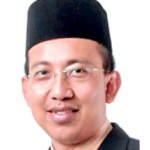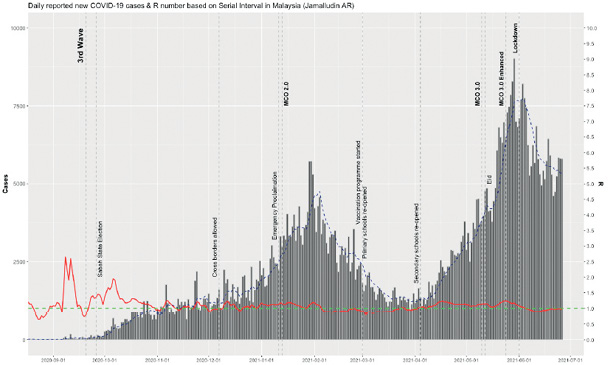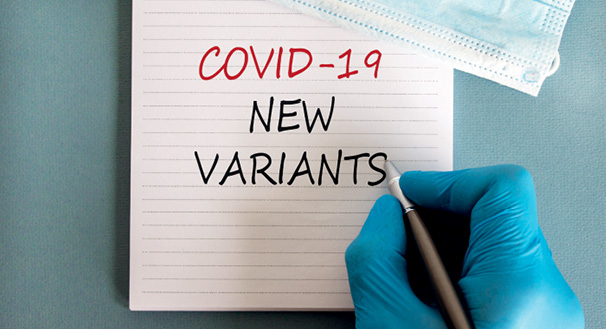While it is difficult for us to control the virus mutation, we can control our own behaviour and movement

BY PROF DR JAMALLUDIN AB RAHMAN
Malaysia is continuing having high number of Covid-19 cases despite the total lockdown implemented since June 1, 2021. Government introduced a recovery plan in four phases, but we are not able to move on to the Phase 2 as our number of cases are still above 4000 cases daily.
Even after more than 500 days since we had the first Covid-19 cases in our country last year, we have failed to move out from the pandemic. Not only Malaysia, but also most parts of the world. This is despite knowing more about the virus and the various vaccines. Our hope is fading. Can we end this pandemic?
Let us go back to basics. Transmission increases due to three factors; 1) Virus factor (agent), 2) Human factor or behaviour (host), and 3) Environment factor; or known as epidemiologic triad. A framework that all epidemiologists know.
Virus factor
The discovery of the new SARS-CoV-2 variant, especially the Delta and Delta Plus variants really challenge the progress we are making in combating the pandemic. The variant is proven to be able to affect the diagnostics, treatment, or vaccines; increase transmissibility and disease severity.
Experts all over the world had predicted this even at the beginning of the pandemic, and now we are racing to stay ahead of this mutation race. Even countries that achieved more than 50 per cent vaccination coverage are also struggling with the new variants.
How do we tackle this? Unfortunately (or fortunately), we still need to rely on the same non-pharmaceutical interventions or better known as public health measures, such as avoiding mass gatherings, wearing facemasks etc. These are ‘boring’ stuff, but very important and effective in stopping the spread.
Data from the UK shows that vaccinated individuals are 94 per cent less likely to be hospitalised. So, there is still hope that vaccines can reduce the severity of the disease.
Unfortunately for Malaysia, we are struggling to get enough vaccines to vaccinate our population. Promotion efforts have successfully increased the confidence from the public to go for vaccination, the government is not able to fulfil the demand.
Albeit late, Malaysia has started its own vaccine development since November last year and expected for animal trials soon before it can be tested on humans.
How about Ivermectin? It is a possible complement to the existing measures that we have, but it must be proven safe and effective first. The Ivermectin trial for high risk Covid-19 patients (I-TECH Study) initiated by the Ministry of Health (MoH) is an indication the government is considering all options to fight the pandemic.
Human behaviour factor
Human behaviour is a part of both the solution and the problem. For our country, our activities and movements dictate how the numbers go.
We had the outbreak controlled previously but a massive movement due to the Sabah state election had caused the third wave of the pandemic, and until now, we are officially still in the third wave. The source of the outbreak was not the political event itself, but due to the widespread clusters from detention centres in Sabah as well as some earlier workplace clusters in Kedah. The movements caused the spill over transmission to the community.
Once the government introduced the Movement Control Order (MCO) in January, we started to see cases going down steadily. In April following the massive movements when we opened schools and following the Eid celebration, the cases accelerated again.
 In June government had to introduce the third MCO and quickly after that, a total lockdown, when number of cases and deaths went beyond 9000 and 120 per day respectively.
In June government had to introduce the third MCO and quickly after that, a total lockdown, when number of cases and deaths went beyond 9000 and 120 per day respectively.
While it is difficult for us to control the virus mutation, we can control our own behaviour and movement. As long as we act only according to the regulation and laws imposed, and the best practice in preventing Covid-19, we cannot win this war.
Even if later cross border travel is allowed, we should still evaluate the risk of travelling. Even if we are allowed later to open schools, we have to continue wearing face masks and limit the number of face-to-face activities until SARS-Cov-2 and its variants are eliminated.
Most of the transmission is due to those close to the patients and rarely from strangers. We tend to let our guard down when we meet those we know, assuming that they are free from Covid-19.
Pandemic fatigue is real, but people might be affected because the MCO might have cost them their job and business. We are allowing states with lower cases of Covid-19 to ease up a bit, to give a breather to the smaller business operators. However, we need to continue educating the public to adhere to the preventive measures.
Both the government and community must join hands and offer help to those affected by this pandemic. All levels of people are affected. Look around us, our family, our neighbours and friends and offer help.
“Worship Allah, and do not associate with Him anything, and be good to parents and to kinsmen and orphans and the needy and the close neighbour and the distant neighbour and the companion at your side and the wayfarer and to those (slaves who are) owned by you. Surely, Allah does not like those who are arrogant, proud” (Al-Quran, An-Nisa: 36). And the Prophet Muhammad (Peace and blessings be upon him) says: “ He is not a believer who eats his fill whilst his neighbour beside him goes hungry.” (Bukhari)
Environment factor
This is by far the most difficult factor to manage. We started the outbreak in the country on shaky political ground. Our economy is also not at its best. These two factors are enough to introduce a big stumbling block to the effort in fighting the pandemic.
We need leaders to be united in fighting this war, not among themselves. We need them to put the rakyat first over their differences and positions.
Some factories are allowed to operate because they produce essential items, for the use of the people and maybe are important to the economy of our country. This contributes to most of the Covid-19 cases now in the country.
Between April 1 and May 26, the manufacturing sector was the main contributor to these workplace clusters, with 132 clusters or 46 per cent found from this sector with majority from Selangor, Johor and Penang.
Can stricter public health measures be enforced on workers? It is not easy. The way they work, which is in close proximity to each other and their crowded hostels or quarters when they return home, is a high risk for SARS-CoV-2 transmission.
The best way is to vaccinate the workers, as many and as fast as possible. Or we could create a safety bubble among the workers so that they will not mix with so many people. Therefore, if there is an outbreak in one bubble, it will not spread to a larger population.
To end the pandemic
In some parts of the world, social events are happening almost like the pre-Covid era. The Tour de France begun on June 26 and thousands of people were out enjoying the race.
Denmark has announced that wearing a face mask is no longer enforced. Even Singapore has started mooting the strategy to live with Covid-19. So, hope is still there for Malaysia to move out from the waves of outbreaks.
It is good that the government has come out with a recovery plan to exit this pandemic, but the indicators and their thresholds may need to be reviewed. They need to be based on existing data, statistics and best evidence.
We need the commitment from every level of society starting from leaders, ministries, universities, NGOs, the community, and every single person in the country. — The Health
Prof Dr Jamalludin Ab Rahman is Deputy Dean (Postgraduate & Research), Kulliyyah of Medicine, International Islamic University Malaysia









